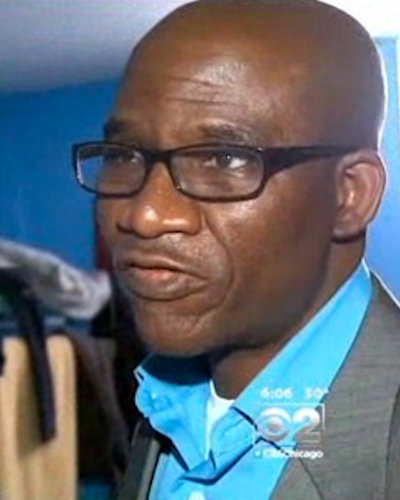
John Adewoye Oral History
Interview
Biography
John Ademola Adewoye was born on July 30, 1959, in the village of Oro in the Nigerian state of Kwara. His father Michael Adewoye tended the gardens for the Notre Dame Sisters while his mother Agnes was a trader in red palm oil. There were also two sisters Josephine and Juliana and a brother, Jacob.
The village population was of the Yoruba tribe and also primarily Roman Catholic in religious expression. John grew up both in the village and also in Lagos where his parents lived from time to time to support his sister in her education. John exhibited effeminate characteristics as a child which led to harassment from his schoolmates. The negative experiences at school led John to deliberately fail the common entrance examination for high school. So he moved to Lagos to live with his sister and enroll in a typing school. Through the constant encouragement of his sister John moved back to his hometown a year later and took the entrance exams for private schools. Initially undecided about what school to attend, John decided to enroll in a religious school, Our Lady and St. Kizito in Ede, and explore becoming a priest. He envisioned a religious school as being a safer place and also had a lifelong fascination with the church and clergy.
In high school John began forming his identity as an advocate for justice and as a rebel. He was informed by his study of the African slave trade and of apartheid in South Africa. When a new school administrator started treating students harshly, even abusively, John helped instigate a revolt against the administrator. This led to his expulsion from school shortly before he took final exams to graduate.
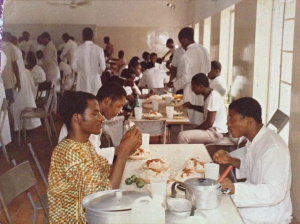 Cafeteria in seminary, early 1980s John was so convinced of his vocation as a priest that he made a deal to return to school to take his final exams and graduate. His bishop advised to take a year off before starting seminary. John lived with his uncle in Ilorin (the capital of his state of origin) where he worked at University of Ilorin library and sang in the cathedral choir.
Cafeteria in seminary, early 1980s John was so convinced of his vocation as a priest that he made a deal to return to school to take his final exams and graduate. His bishop advised to take a year off before starting seminary. John lived with his uncle in Ilorin (the capital of his state of origin) where he worked at University of Ilorin library and sang in the cathedral choir.
John began seminary in 1980 at SS. Peter and Paul Major Seminary, Bodija Ibadan. John grew comfortable there as he met people like himself. He had boyfriends and sexual relationships at the school. But he thrived in his studies and was ordained a priest on September 27, 1987 in his hometown. Most of the Catholic priests in Nigeria at that time were European; John was among a small, but growing number of indigenous priests.
John’s first appointment was as assistant cathedral administrator at St. Joseph’s in Ilorin. John found that position too stressful for a young priest, so a year later he became pastor at St. James’ Church, also in Ilorin. He also was overseer of additional, smaller churches. John prospered in his ministry at St. James’ and served there from 1988 to 1992. At that point the bishop asked him to return to the cathedral as the administrator, the first Nigerian in that position. John served there from 1992 to 1998. Even as John became an increasingly public figure in the church, he continued to have intimate relationships with men. He also grew more and more vocal about the oppressive military rule in Nigeria. Concerned that he was increasingly vulnerable because of his opposition to the government while having sex with men, John left the cathedral and went to St. Bartholomew’s in a small town a distance away, on the border with Benin.
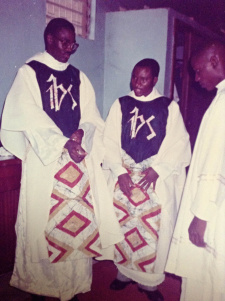 Assisting friend with his first mass John found information about special ministries in the U.S. that purported to turn someone like himself into a heterosexual. Uncertain about his vocation and future, he planned a sabbatical year in 1999 to get away and re-evaluate the direction of his life. He considered going to Ireland since a number of the priests who had mentored him were from there. But he eventually decided to go to the U.S. largely to investigate reparative therapy. He contacted a friend and colleague in the Archdiocese of Chicago who arranged for John to stay and work there. John left Nigeria on December 13th, 1999 and arrived in the U.S. the next day.
Assisting friend with his first mass John found information about special ministries in the U.S. that purported to turn someone like himself into a heterosexual. Uncertain about his vocation and future, he planned a sabbatical year in 1999 to get away and re-evaluate the direction of his life. He considered going to Ireland since a number of the priests who had mentored him were from there. But he eventually decided to go to the U.S. largely to investigate reparative therapy. He contacted a friend and colleague in the Archdiocese of Chicago who arranged for John to stay and work there. John left Nigeria on December 13th, 1999 and arrived in the U.S. the next day.
As he considered opportunities for ministry in Chicago, John learned about clinical pastoral education which fit well with his positive experiences with visiting and caring for people who were sick and elderly. This training led John to deeper self-examination and raised questions about his faith and his identity. He began working as a chaplain at the University of Chicago Hospital and gradually grew more comfortable with understanding himself as a gay man. He began attending Mass at AGLO (the Archdiocesan Gay & Lesbian Outreach) and got to know gay and lesbian persons. He began to dream of returning to Nigeria and starting a ministry for LGBT persons.
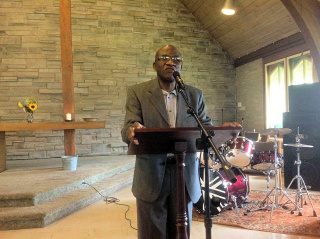 Speaking in Chicago area church about asylum program Growing in self-affirmation John decided to come out in correspondence to family and friends back in Nigeria, including his bishop. He shared his desire to return there to start a ministry with LGBT persons. His coming out was received negatively by a good number of colleagues. The bishop responded that he was disappointed in John but would consider allowing him to start a new ministry. However, the bishop repeatedly would not take action to support John. At the same time more overt persecution of LGBT persons was springing up in Nigeria.
Speaking in Chicago area church about asylum program Growing in self-affirmation John decided to come out in correspondence to family and friends back in Nigeria, including his bishop. He shared his desire to return there to start a ministry with LGBT persons. His coming out was received negatively by a good number of colleagues. The bishop responded that he was disappointed in John but would consider allowing him to start a new ministry. However, the bishop repeatedly would not take action to support John. At the same time more overt persecution of LGBT persons was springing up in Nigeria.
As it was becoming clear that opportunities for him as a priest in Nigeria were being shut off and he was becoming more assured in his identity as a gay men, John left the priesthood in 2003. He stayed in the Chicago area and started a masters program in social work which he completed in 2006. But he continued to be drawn to work as a chaplain. John began using the Internet and social media to tell his story and to advocate for LGBT persons in Nigeria and Africa. He sought and was granted asylum in the U.S. in 2007 and in 2014 became a U.S. citizen.
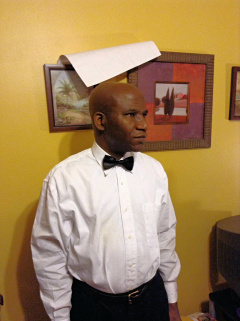 At home in Riverdale He began Courage Nigeria as a Facebook group and devoted significant time to provide online support and assistance to others struggling with their sexual identity. As he learned of a gay man from Zambia needing a place to live temporarily, John invited him into the guest bedroom in his home. Seeing the needs of African gay men seeking asylum in the U.S. John joined with colleagues to find ways to provide housing and basic subsistence for them. John’s dream became to create an organization called the Center for Integration and Courageous Living. He provided leadership with others to form CLASP, the Chicago LGBT Asylum Support Program.
At home in Riverdale He began Courage Nigeria as a Facebook group and devoted significant time to provide online support and assistance to others struggling with their sexual identity. As he learned of a gay man from Zambia needing a place to live temporarily, John invited him into the guest bedroom in his home. Seeing the needs of African gay men seeking asylum in the U.S. John joined with colleagues to find ways to provide housing and basic subsistence for them. John’s dream became to create an organization called the Center for Integration and Courageous Living. He provided leadership with others to form CLASP, the Chicago LGBT Asylum Support Program.
John returned to Nigeria for a visit with family and friends in 2013. Despite his nervousness about being back there as an openly gay man, the visit went well. Yet John realized that his passion to provide empowerment for persons who grew up like he did can be best realized in the U.S.
Biography Date: February 2015
Additional Resources
Profiles:
Tags
Catholic (Roman) | Activist (religious institutions) | International Human Rights | Online activist | Ordination/clergy | Chicago | Illinois | Nigeria | Adewoye, John
Citation
“John Adewoye | Oral History”, LGBTQ Religious Archives Network, accessed April 23, 2024, https://lgbtqreligiousarchives.org/oral-histories/john-adewoye.